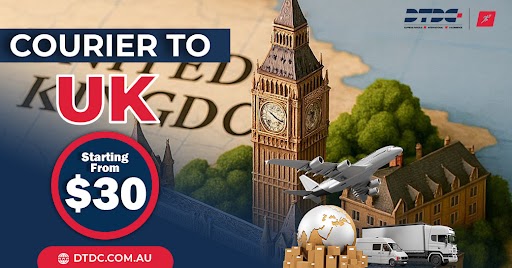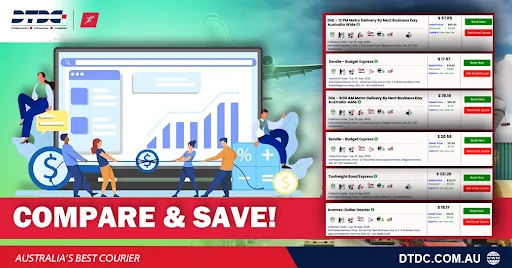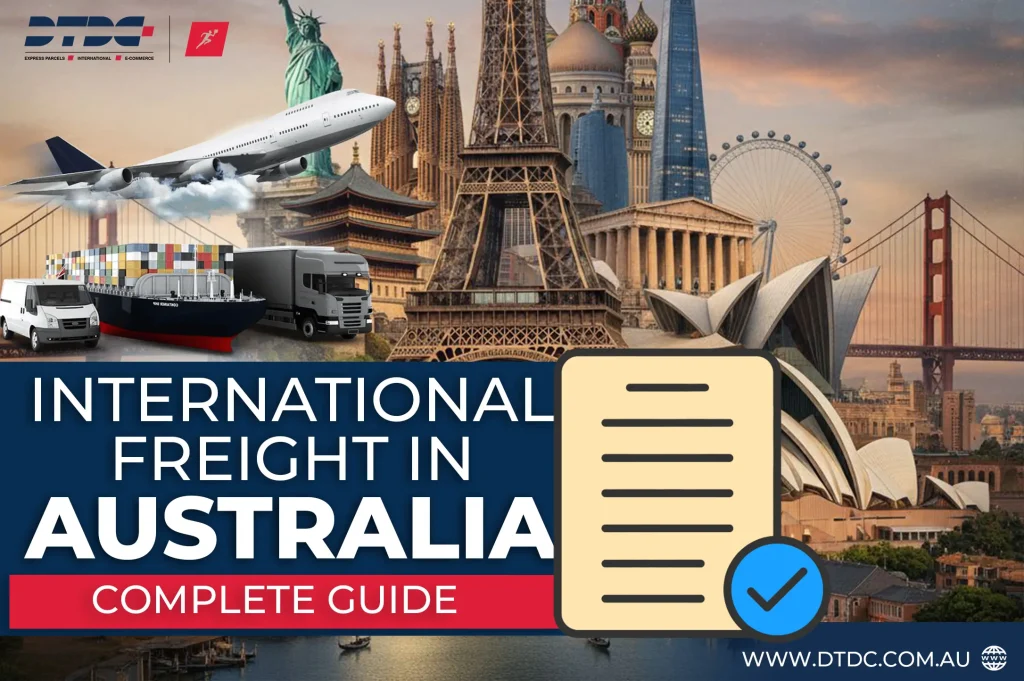International freight is a critical link between Australia and the rest of the world. From raw materials and manufactured products to personal effects, freight services facilitate the delivery of goods to international markets in the most efficient manner.
For businesses, international shipping involves not only transportation, but also supply chain management, cost efficiency, and timely delivery. There are a variety of shipping companies with different costs, and the variety of shipping options can be overwhelming.
This guide will answer all your questions, such as where to get an international freight quote and the importance of freight forwarders. Before diving into the costs and quotes, let’s first understand what international freight really means.
What Is International Freight?
Definition and Importance in Global Trade
International freight can be defined as the transportation of products across geographical boundaries either via sea, air or land. Without it, Australia’s import and export sector would cease to exist, affecting everything from retail shelves to e-commerce deliveries.
In the case of Australia, international shipping would facilitate the growth of the economy, which is highly reliant on global trade. Exports such as minerals, agricultural and manufactured goods are dependent on sea as well as air transportation.
While international logistics connects Australia to the world, it is very different from shipping goods domestically.
Difference Between Domestic and International Freight Shipping
Domestic freight is the process of moving goods within the country of Australia. Prices are typically cheaper, and the operations are less complicated. In comparison, international freight shipping involves several layers of regulations, customer clearance and international carriers.
Complexity and compliance are the primary differences between the two. International shipping involves the handling of duties, taxes, and international shipping freight regulations, which in most cases differ in each country.
Types of International Freight Services
International Sea Freight (FCL & LCL): Transport of goods between continents by means of sea. It is more affordable for heavy, bulky, or non-urgent shipments. Two major variants of sea freight are Full Container Load (FCL) and Less than Container Load (LCL).
FCL is suitable for goods that need a complete container and hence a higher level of security, as the container is not shared. LCL enables shippers to share the container space, which reduces the cost.
International Air Freight: Freight transportation through air is preferred when the shipment is time-sensitive and of high value. Even though it is more costly than sea freight, it is a faster mode of delivery as it only takes days compared to weeks by sea freight.
Road & Surface Transport in Cross-Border Trade: Despite the geographical isolation of Australia, road transport contributes to international freight across Europe, Asia and North America. In these areas, goods arrive by sea or air and are then transported by truck or rail, making land transportation a significant part of the supply chain.
Choosing between sea, air, or land freight is just the first step; the real challenge lies in managing customs, paperwork, and logistics. Let’s look at the key aspects that shape every international shipment.
Key Aspects of International Freight Shipping
Customs Clearance & Compliance: One of the most important stages of international shipping freight is customs clearance. It ensures compliance with all the legal requirements of the countries of origin and destination.
Essential Documentation for International Freight: Documents like Bill of Lading, Air Waybill, Commercial Invoice and a Certificate of Origin are required. All the documents have a purpose, be it establishing ownership, stating goods or facilitating clearance of goods.
Logistics Management & End-to-End Solutions: Warehousing, packaging, distribution and final delivery are also important parts of overseas freight movement. The global freight companies offer end-to-end solutions providing efficiency from origin to the final destination.
Role of International Freight Forwarding Companies: Freight forwarders assist businesses in navigating shipping more effectively and prevent frequent traps. They also provide other services like consolidation, insurance and cargo tracking. Collaborating with a reputable freight forwarder can make the process more affordable, reliable, and stress-free.
How To Get an International Freight Quote in Australia
Here’s a step-by-step guide to obtaining an accurate overseas freight quote in Australia.
Step 1: Choosing International Freight Companies
Reputable international freight companies offer clear prices, skilled personnel and strong networks. Checking reviews, service comparison and evaluating customer care service are necessary when finding a partner. It is also very important to have companies that have experience in your trade routes.
Step 2: Getting an International Freight Quote
An international freight quote usually includes freight, fuel, and handling costs, as well as customs charges and insurance. Some quotes might also contain warehousing or packaging charges, depending on the provider. You should ask for the breakdown of the total cost to evade any unwanted charges.
Step 3: Providing Shipment Details & Booking: Freight forwarders and carriers would require data on weight, dimensions, type of goods and delivery point. Delivering such data will ensure that there is clarity in pricing and uncertainties are avoided.
Step 4: Tracking & Managing Your Shipment: The Majority of international freight carriers have real-time tracking solutions, which can be used to track the progress of a shipment. This visibility guarantees better planning and less uncertainty.
While it’s possible to manage quotes and shipping on your own, many businesses rely on freight forwarders for added efficiency and cost savings.
Benefits of Using International Freight Forwarding Services
Cost-Effectiveness: Freight forwarders often get bulk rates from carriers, and this advantage can be passed to their clients. They also make small shipments cheaper by consolidating the shipments. This signifies that freight forwarders are cost-effective for both small and large businesses.
Time Efficiency & Reliability: All the logistics activities are taken care of by freight forwarding companies, which saves time in the management of shipments. Freight forwarders are most likely to have alternative solutions whenever they are met with challenges, and this ensures reliability.
Expertise in Global Trade Regulations: Freight forwarders bring expertise in compliance, ensuring that shipments meet all legal requirements. This knowledge helps businesses avoid fines, penalties, and delays.
How To Choose the Best International Freight Provider
Price is not the only factor to consider when selecting the appropriate provider. An effective freight partner is reliable, transparent and provides solutions. Their track record, industry reputation and customer reviews give insights into their quality of service.
The variety of services to be provided is also worth considering. The best providers are those that deal with international freight by sea and air, as well as customs clearance and logistics. Through the collaboration with a flexible provider, companies become more flexible and convenient.
Once you’ve finalised the freight service provider, the next question is cost. Freight charges vary widely depending on several factors.
International Freight Costs Explained
International freight cost is based on several variables. One of the largest factors is the mode of transport; international sea freight is cheaper, whereas international air freight is faster but more expensive. Weight and size of the cargo are of significant contribution, and the charges are based on actual or volumetric weight.
Other cost factors are customs duties, taxes and insurance. The destination also matters, as distant locations and isolated destinations are more expensive. Through the knowledge of these elements, shippers can make better plans, compare shipping rates across borders properly and eliminate unforeseen costs.
Cost Example: Sydney to the USA and the UK
- Sydney to Los Angeles (Sea Freight, FCL 20ft container): Approx. AUD $3,500–$5,000 with 25–30 days transit.
- Sydney to Los Angeles (Air Freight, 100kg cargo): Approx. AUD $1,200–$1,800 with 5–7 days transit.
- Sydney to London (Sea Freight, LCL 2m³ cargo): Approx. AUD $500–$700 with 35–40 days transit.
- Sydney to London (Air Freight, 100kg cargo): Approx. AUD $1,600–$2,200 with 6–8 days transit.
These are indicative rates and vary depending on the freight company, season, and market demand. Getting an updated international freight quote is always recommended.
Sea Freight vs Air Freight: Comparison Table
To make cost comparison easier, here’s a side-by-side analysis of sea and air freight methods.
| Feature | International Sea Freight | International Air Freight |
| Cost | Lower, ideal for bulk cargo | Higher, charged by weight/volume |
| Transit Time | 25–40 days depending on route | 3–10 days on average |
| Best For | Large, heavy, non-urgent shipments | Urgent, high-value, or perishable goods |
| Reliability | Subject to port congestion & weather | Highly reliable, frequent schedules |
| Environmental Impact | More eco-friendly per unit | Higher carbon emissions |
| Flexibility | FCL & LCL options available | Weight/volume restrictions apply |
Costs and speed are not the only factors that drive international freight, as it comes with its own set of challenges.
Challenges in International Freight and How To Overcome Them
Some of the most common challenges found in international freight movement are:
- Customs Delays – Partner with freight forwarding agents who take care of documents accurately.
- Expensive Freight Rates – Compare different international freight prices and schedule the shipments in advance.
- Cargo Damage or Loss– Always opt for insurance for goods and partner with reputable international freight companies.
- Regulatory Complexity – Use freight forwarders that have expertise with trade regulations and compliance, such as DTDC Australia.
- Unpredictable Delays – Track shipment on a regular basis to avoid delays caused by weather, strikes and port congestion. Maintain a flexible schedule that does not affect customer satisfaction.
By anticipating these challenges and planning ahead, businesses can transform freight shipping from a stressful task into a strategic advantage.
Conclusion
International freight has been crucial in linking Australia with the rest of the world. Knowledge of the operations of international freight in Australia, from sea to air freight, benefits shippers in making wise decisions.
With the right approach, international freight shipping becomes not just manageable but a strategic advantage for trade and growth. It is important to select a reputable freight provider, whether you are shipping a container overseas or urgently delivering goods by air.
DTDC Australia is one such service provider with strong expertise in international freight and customs clearance in all major freight forwarding locations. Contact our team to know more and get a personalised quote.













